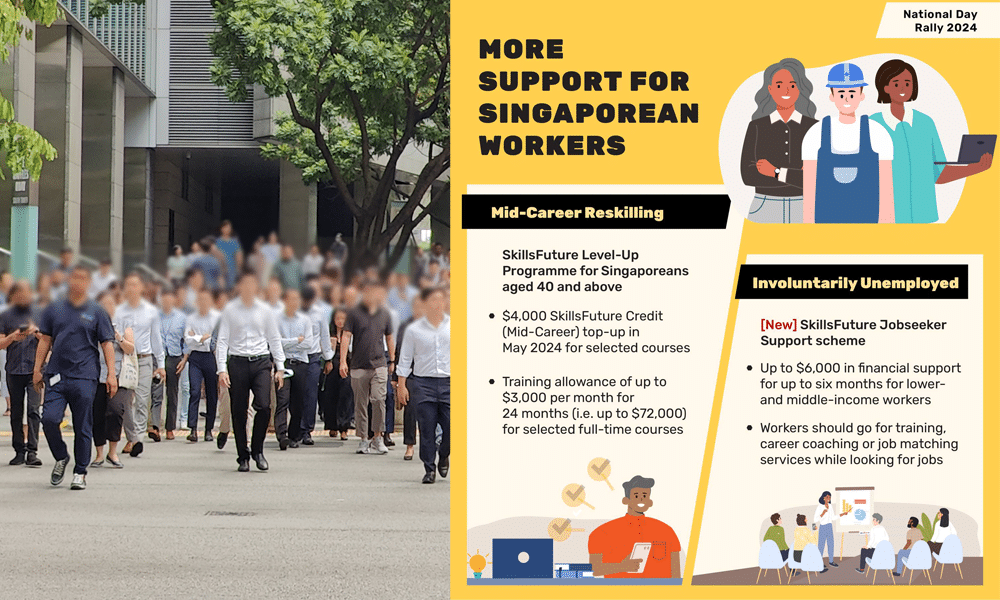Singapore has announced a new scheme that will provide up to S$6,000 in financial support over six months to individuals who have been retrenched. This initiative, called the SkillsFuture Jobseeker Support scheme, is designed to assist Singaporeans and permanent residents aged 21 and above who have been involuntarily unemployed and meet specific eligibility criteria.
The scheme, which was first mentioned by Prime Minister Lawrence Wong during the National Day Rally earlier this month, is scheduled to launch in April 2025 for Singaporean citizens and in the first quarter of 2026 for permanent residents.
It is expected to benefit approximately 60,000 eligible residents annually.
Eligibility and Conditions
To be eligible, applicants must have previously earned an average of up to S$5,000 per month and must reside in a property with an annual value of S$25,000 or less. This condition includes all Housing Board flats and some lower-value private properties, focusing on lower- and middle-income workers who may face financial pressure after losing their jobs.
Manpower Minister Tan See Leng highlighted that this scheme represents a shift in the government’s approach to supporting unemployed individuals, with over S$200 million allocated annually for the initiative.
“This is the first time we are providing temporary financial support to those who are involuntarily unemployed, with the expectation that they will engage in activities to enhance their chances of finding a job,” Dr Tan said during a speech at the Devan Nair Institute.
The scheme’s payouts are tiered, starting at a maximum of S$1,500 in the first month and gradually decreasing over the following months. The total payout will not exceed the individual’s previous monthly salary, and payments will stop if the person finds new employment during the support period.
Job Search Requirements
Applicants are required to participate in job search activities as part of the scheme. These activities include submitting job applications, attending career coaching sessions, and enrolling in eligible training courses. The Ministry of Manpower (MOM) and Workforce Singapore (WSG) will provide more details on these requirements closer to the scheme’s launch.
Dr Tan emphasized that the scheme is intended as temporary support during the job search process, rather than a long-term social assistance programme. “The initial higher payouts are meant to provide some assurance immediately after job loss, while the gradual reduction aims to encourage timely re-entry into the workforce,” he explained.
Additional Support
The SkillsFuture Jobseeker Support scheme can be combined with other existing financial assistance programmes. Eligible individuals may also receive additional support through schemes such as the ComCare Short-to-Medium-Term Assistance and the Goods and Services Tax (GST) Voucher scheme.
Moreover, those participating in full-time, long-form training under the SkillsFuture Level-Up Programme or company attachments under WSG’s Mid-Career Pathways Programme may receive extra training allowances.
For instance, a displaced mature worker earning S$5,000 a month could potentially receive up to S$21,000 over six months, combining training allowances and jobseeker support payouts.
The introduction of this scheme marks a significant development in Singapore’s social support landscape, but it is important to view it in the context of the government’s previous stance on unemployment benefits.
Just a few years ago, in 2020, then-Minister for Manpower Josephine Teo expressed strong reservations about the idea of unemployment insurance, which was proposed by Workers’ Party’s Sylvia Lim.
Mrs Teo argued that such a scheme could reduce workers’ motivation to find new employment and decrease employers’ willingness to offer retrenchment benefits.
Way back in 2006, the Workers’ Party suggested a scheme in its election manifesto where both workers and employers would contribute a small percentage of salaries to a fund for unemployment insurance payouts, aiming to provide better protection for workers.
However, Mrs Teo highlighted the potential downsides, citing examples from other countries with high unemployment rates that provide similar insurance. Instead, she pointed to Singapore’s existing programmes like SkillsFuture and Adapt and Grow, which focus on retraining and upskilling workers.
The shift towards offering direct financial support could be seen as a response to growing public concern about job security, particularly in a challenging economic environment.
However, the rollout of this scheme so close to the election also invites speculation about its intent. Is this a genuine change in policy to address long-standing gaps in social support, or is it an attempt to “sweeten the ground” and gain favor with voters?
The timing and framing of such initiatives often play a crucial role in political strategy, and the upcoming election undoubtedly adds a layer of complexity to how this new policy is perceived by the public.
Ultimately, whether this is a change in perspective or a political tactic will depend on how the scheme is implemented and whether it leads to lasting changes in the government’s approach to social welfare and unemployment support.
Voters will likely be watching closely to see if this initiative is part of a broader commitment to social support or a short-term measure aligned with electoral considerations.

